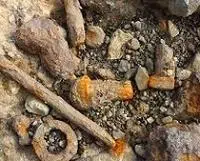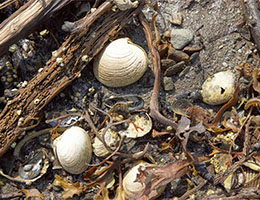 The term detritus , also mentioned as detritus , comes from the Latin word detrītus , which translates as “worn.” The concept is used in medicine and geology to name the product resulting from the disintegration of a solid matter into particles .
The term detritus , also mentioned as detritus , comes from the Latin word detrītus , which translates as “worn.” The concept is used in medicine and geology to name the product resulting from the disintegration of a solid matter into particles .
In general, the notion of detritus is used, in the plural. The adjective detrital is also frequently used, which refers to that which is made up of detritus.
In the specific field of geology , detritus is the rock sediments that are generated by the action of diagenesis, weathering or erosion. These debris usually accumulate in sedimentary basins and make up the so-called sedimentary rocks .
An example of a material formed by detritus is clay , which arises from the weathering of feldspar minerals. This sedimentary rock is a colloid that develops with the accumulation of aluminum silicates that come from the decomposition of granite and other rocks that contain feldspar.
A debris cone , on the other hand, is a structure that arises from the accumulation of pieces of rock fallen from a hillside or cliff. When they end in a valley, they pile up in a kind of cone .
For biology , detritus is the solid that arises when organic matter decomposes. It is, therefore, dead matter that comes from animals or plants.
Organic matter is understood to be that which is made up of organic compounds that originate from the remains of organisms that have been alive, such as animals and plants, but also their waste products found in a natural environment. Other names by which this concept is known are natural organic material or, simply, organic material .
 A large number of species of protists, fungi and bacteria fall into the group of detritivores , precisely because they feed on organic matter in a state of decomposition, that is, detritus. These living beings are also known by the names detritophages, decomposers or saprophages .
A large number of species of protists, fungi and bacteria fall into the group of detritivores , precisely because they feed on organic matter in a state of decomposition, that is, detritus. These living beings are also known by the names detritophages, decomposers or saprophages .
Detritivores are a fundamental part of ecosystems , since without them the recycling of nutrients and the decomposition of organic matter could not be carried out. It is known that many of these living beings do not have the capacity to digest portions of organic material, but they can absorb it at a molecular level, and these are the most important within this group. Some scientists do not include scavengers in this group, because they consume large pieces of food.
Outside of the detritivores mentioned above, we can find many others, such as the following: millipedes (formally called diplopods , a class whose most outstanding characteristic is that it has two pairs of articulated legs in almost all the double segments of its body); scale insects (also known as ground bugs, ball bugs or ball bugs ); carrion flies belonging to the family Sarcophagidae ; the worms.
Many insects are also considered detritivores, among which we find some types of fiddler crabs (which are characterized by digging burrows in the sand banks of the marshy terrain of the sea waters), terebellids (they are also known by the name of worms of bristles , they are usually very small and lead sedentary lives), polychaetes (believed to represent the oldest group of annelids, a phylum of invertebrate animals that usually have their bodies divided into segments and look like a worm) and beetles.
Plastic debris , finally, is waste produced by human activities that, whether accidentally or on purpose, ends up in seas , rivers, lakes or other bodies of water.
